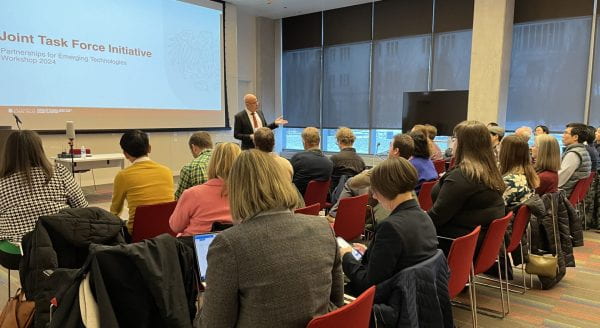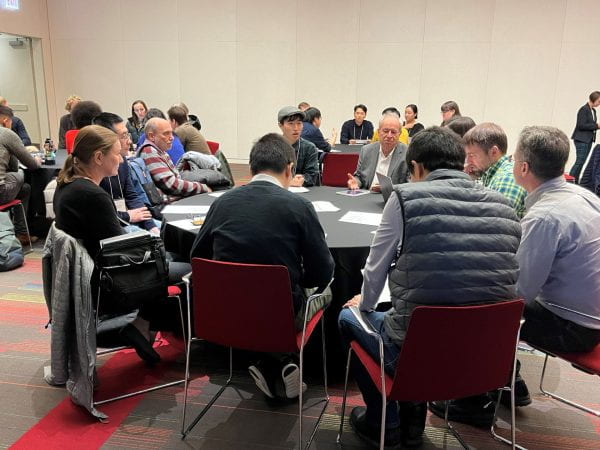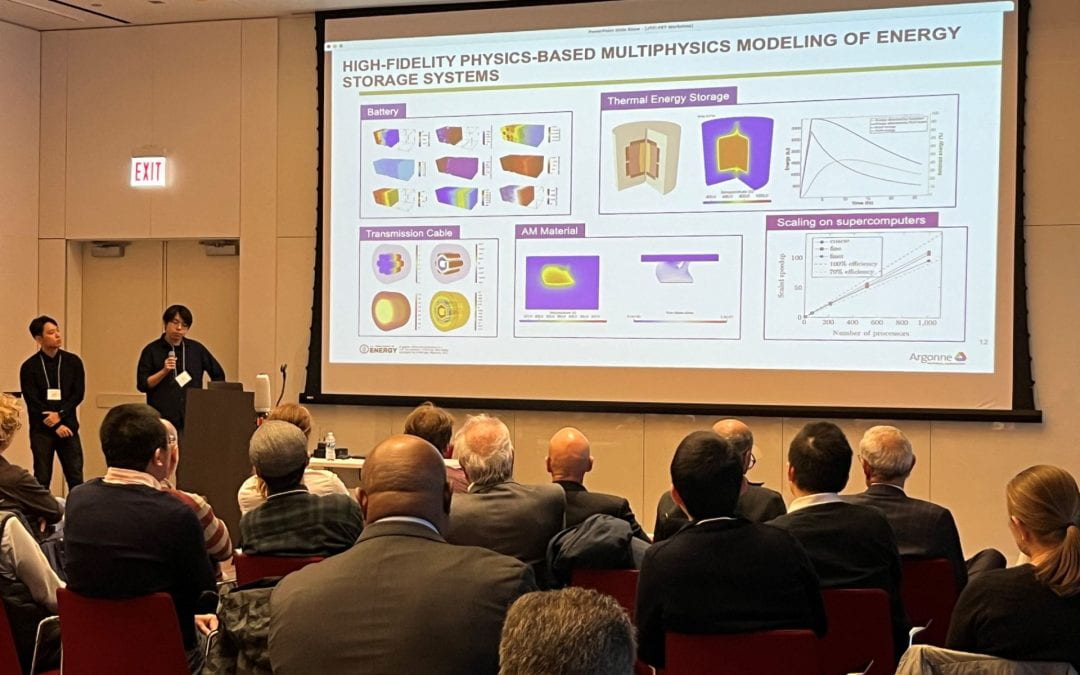UChicago’s Joint Task Force Initiative (JTFI) hosted a special event in January to bring together recent awardees of JTFI’s Partnerships for Emerging Technologies seed funding. JTFI, which aims to deepen collaborative research opportunities across the University, Argonne National Laboratory, and Fermi National Accelerator Laboratory, awarded more than $2 million in seed funding over the next two years to twelve joint projects.
 JTFI invited researchers to submit proposals in four broad and impactful categories: carbon-neutral and renewable energy technologies; microelectronics; the use of artificial intelligence (AI), robotics, and machine learning to support high-throughput autonomous discovery; and AI and microelectronics for advanced scientific instrumentation and experimentation. Each of the project teams is comprised of at least one principal investigator from the University of Chicago and at least one or both national laboratories.
JTFI invited researchers to submit proposals in four broad and impactful categories: carbon-neutral and renewable energy technologies; microelectronics; the use of artificial intelligence (AI), robotics, and machine learning to support high-throughput autonomous discovery; and AI and microelectronics for advanced scientific instrumentation and experimentation. Each of the project teams is comprised of at least one principal investigator from the University of Chicago and at least one or both national laboratories.
Juan de Pablo, Executive Vice President for Science, Innovation, National Laboratories, and Global Initiatives at the University of Chicago told the assembled guests that the funded projects are each of critical national and global interest. “We’re confident that your projects will each play a role in advancing science in these areas in the near term,” he said, “but more importantly, we hope that existing collaborations across our institutions continue to flourish and that new partnerships are created as a result of the JTFI network.”
The JTFI invited researchers to submit proposals in four broad and impactful categories: the development of carbon-neutral and renewable energy technologies, the creation and novel use of microelectronics, the use of artificial intelligence, robotics, and machine learning to support high-throughput autonomous discovery, and the use of AI and microelectronics to aid in conducting advanced scientific instrumentation and experimentation. Each of the projects features teams comprised of at least one investigator each from the University of Chicago and one or both of the national laboratories.
 Each of the twelve joint teams presented their project’s research goals, their early progress, and opportunities to collaborate with other researchers. Following these presentations, the group engaged in roundtable discussions about the potential of their work, the benefits and challenges of collaboration between the national laboratories and researchers on the University of Chicago campus, and opportunities to expand partnerships. The discussions were centered around the research categories, including AI, microelectronics, and energy technologies, but there was a common interest in the opportunities to increase communication between institutions, share knowledge, and take advantage of powerful tools available only through cross-collaboration.
Each of the twelve joint teams presented their project’s research goals, their early progress, and opportunities to collaborate with other researchers. Following these presentations, the group engaged in roundtable discussions about the potential of their work, the benefits and challenges of collaboration between the national laboratories and researchers on the University of Chicago campus, and opportunities to expand partnerships. The discussions were centered around the research categories, including AI, microelectronics, and energy technologies, but there was a common interest in the opportunities to increase communication between institutions, share knowledge, and take advantage of powerful tools available only through cross-collaboration.
Since the Joint Task Force Initiative launched in 2018, the University has committed significant resources to help the national laboratories achieve mission success by opening communication channels and fostering collaboration across institutions. The University manages Argonne for the U.S. Department of Energy through UChicago Argonne, LLC and Fermilab together with the Universities Research Association, Inc. through the Fermi Research Alliance.
This year’s twelve funded proposals:
Automated Programmable Fabrication of Monodisperse Sequence-Defined Conjugated Polymers Enabled by Artificial Intelligence-Aided High-Throughput Robotic Systems
UChicago PI: Guangbin Dong – Chemistry Department; Co-PI: Jie Xu – Argonne National Laboratory
Characterizing, modeling and predicting degradation mechanisms in all-solid state batteries
UChicago PI: Shirley Meng – Pritzker School of Molecular Engineering; Co-PIs: Gary Hu, Bipul Barua, Eungje Lee – Argonne National Laboratory
CMOS Pixel Sensors: Enabling Particle Physics Discoveries with Advanced US Microelectronics
UChicago PI: Karri DiPetrillo – Department of Physics; Co-PIs: Farah Fahim, Pamela Klabbers – Fermi National Accelerator Laboratory; Jinlong Zhang – Argonne National Laboratory
Discovering new physics with autonomous data-processing and filtering at high-throughput physics facilities using real-time AI and embedded systems
UChicago PIs: David Miller – Department of Physics, Yuxin Chen – Department of Computer Science, Cecilia Tosciri – Enrico Fermi Institute; Co-PIs: Christian Herwig, Jennifer Ngadiuba, Nhan Tran – Fermi National Accelerator Laboratory
Edge Intelligence via Compositional Learning: Neuromorphic Electrochemical Transistor Arrays
PI: Fangfang Xia, Argonne National Laboratory; UChicago Co-PI: Sihong Wang – Pritzker School of Molecular Engineering
Enabling Exascale Discovery in Neutrino Science
UChicago PI: David Schmitz – Department of Physics/Enrico Fermi Institute; Co-PI: Corey Adams – Argonne National Laboratory
A High-Performance Multi-Channel Low-Power ASIC with One Pico-second Resolution for Emerging Detector Technologies
UChicago PIs: Henry Frisch – Department of Physics, Eric Oberla – Department of Astronomy & Astrophysics; Co-PIs: Troy England, Sudeshna Ganguly, Paul Rubinov, Katsuya Yonehara – Fermi National Accelerator Laboratory
Leveraging integrated machine learning, simulation, and automation to enable solid-state mixed ion-electron conducting polymers
UChicago PIs: Sihong Wang, Paul Nealey – Pritzker School of Molecular Engineering; Co-PI: Jie Xu – Argonne National Laboratory
A mix-dopant strategy to achieve PGE-free OER catalysts for H2 production via water electrolysis
UChicago PI: Chong Liu – Pritzker School of Molecular Engineering; Co-PI: Di-Jia Liu – Argonne National Laboratory
Multi frame storage enabled by Direct Write techniques and circuit design for new multi-frame storage microelectronics hardware: enablement for high speed, high dynamic range cameras
UChicago PI: Supratik Guha – Pritzker School of Molecular Engineering/Argonne National Laboratory; Co-PIs: Farah Fahim, Hongzhi Sun – Fermi National Accelerator Laboratory
Single-Crystal Silicon Carbide Membranes for Heterogeneous Microelectronics and Quantum Technologies
UChicago PI: Alexander High – Pritzker School of Molecular Engineering; Co-PIs: Stephan Hruszkewycz – Argonne National Laboratory
Terahertz imaging spectroscopy for high-throughput non-contact charge transport mechanistic study and materials discovery
UChicago PI: Po-Chun Hsu – Pritzker School of Molecular Engineering; Co-PI: Jie Xu – Argonne National Laboratory

